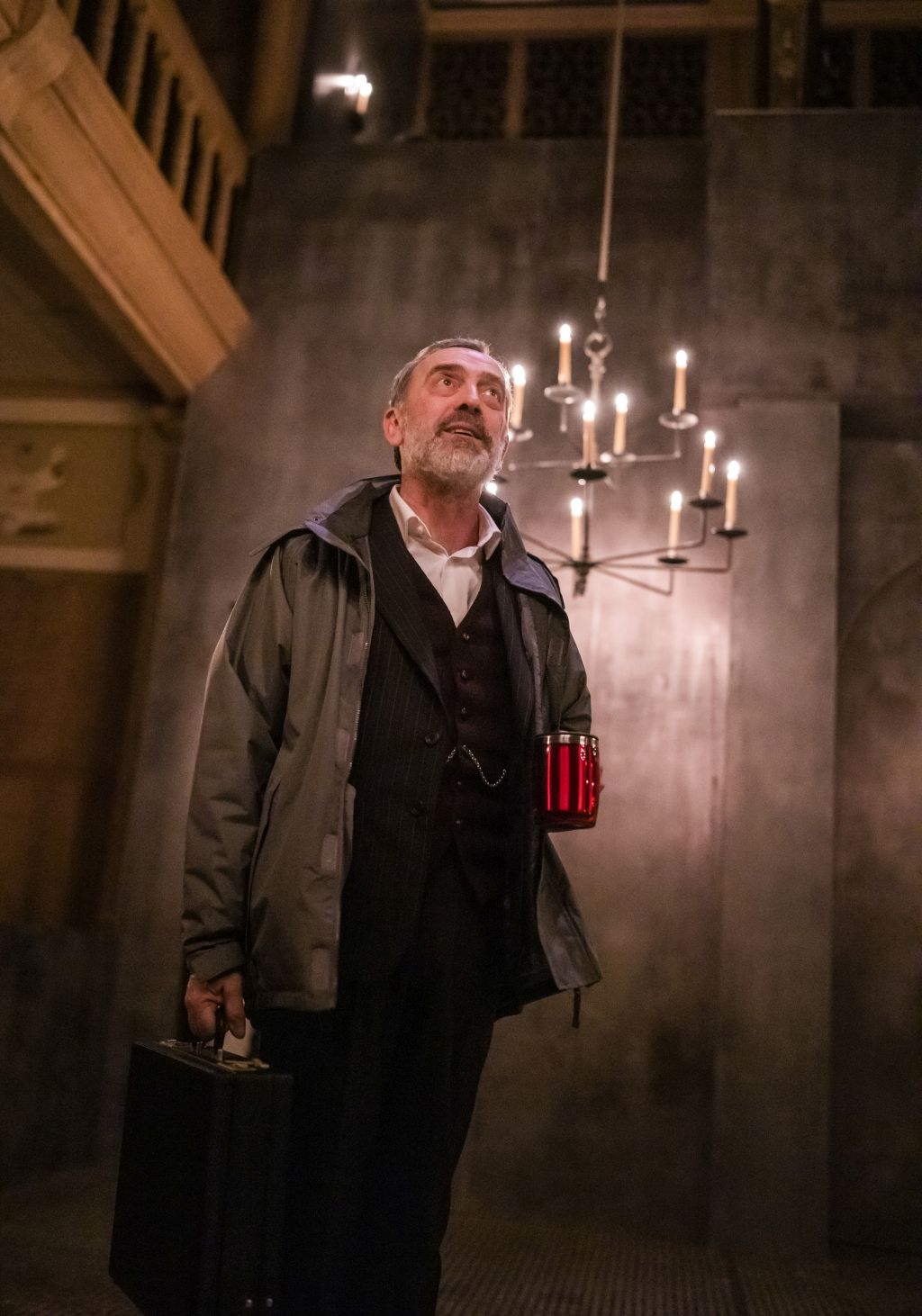The Merchant of Venice is a comedy, you say? Shakespeare, as ever, refuses to be confined to convenient boxes, his best plays’ extraordinary pliability and longevity a testament to the piercing eye he cast towards the slings and arrows that assail humankind. More than most of his works, The Merchant of Venice requires a director to take a stance, especially these days, so as to send the audience in a chosen direction. This is not unique - no text can. nor should, be sacred - but those decisions bubble closer to the surface in The Merchant than perhaps any other play in the canon.
Director Abigail Graham is a Jew herself and, from the very start, that word, that identity, lies at the heart of the play. In modern dress, yobs brimming with entitlement scream the word every time Launcelot (Aaron Vodovoz), Shylock’s servant, attempts to explain that he is transferring his service to Bassanio (Michael Marcus). This Venice is a world in which money grants the right to abuse with impunity an underclass suitable only to be spat upon - and, of course, as a source of capital.
 Shylock isn’t having it, as much to preserve his own crumbling self-esteem as to disabuse his tormentors. The heartbreaking "Hath not a Jew eyes?” speech here closes the first half, played initially as a lament rather than a statement of resistance: a man broken by his beloved daughter Jessica’s absconding with much of his wealth. But the speech turns, Shylock resolves to see his debt paid and revenge hangs in the air all through the interval: his hand, in time, will indeed reach up to the cold heart of Antonio (Michael Gould), the "merchant" of the title, and exact its pound of flesh.
Shylock isn’t having it, as much to preserve his own crumbling self-esteem as to disabuse his tormentors. The heartbreaking "Hath not a Jew eyes?” speech here closes the first half, played initially as a lament rather than a statement of resistance: a man broken by his beloved daughter Jessica’s absconding with much of his wealth. But the speech turns, Shylock resolves to see his debt paid and revenge hangs in the air all through the interval: his hand, in time, will indeed reach up to the cold heart of Antonio (Michael Gould), the "merchant" of the title, and exact its pound of flesh.
So are our sympathies channeled, comforting those of us who always side with / understand / cheer on Shylock in his obstinacy when he refuses to exercise mercy and clasps the knife, his touching unfamiliarity with violence signalled by the Tupperware container he brings along to weigh his bounty. Though a 21st century liberal can never feel entirely at ease with the prospect of a man’s life being taken in a court of law, Adrian Schiller’s superbly understated, steely but all too human Shylock (pictured above) forces us to accept that mitigation, as a subset of mercy, is the most Antonio should plead. Perhaps Shylock’s story has never been told more compassionately.
That said, Shylock is in but five scenes of a long play, cut to just over two hours in this version which happily loses Shakespeare’s more facile subplots. Portia’s story is more interesting than wholly successful in its conception and execution. Her suitors arrive as contestants for a nightmarish episode of Blind Date, with Narissa (Tripti Tripuraneni) in the Cilla Black role and Portia seemingly happy to be the objectified prize. A similar set up was used in Rupert Goold’s Las Vegas-set Merchant at the Almeida in 2014, but that production fully committed to its ethos; this one makes the set piece scene look like a less than imaginative role play conjured in drama school.
That, in turn, gives Sophie Melville a problem when she immediately has to pivot from the girl who is surely too clever not to subvert her father’s absurd conditions for finding a husband to a barrack room lawyer (in disguise) who use her swaggering sense that the world should bend to her will in order to condemn Shylock to his appalling fate. Portia always demands that we weigh her cleverness against her ruthlessness, and there’s no question here which way those scales tip, which she in turn seems to realise as the yobs revert to type.
We conclude as we started, by which time Eleanor Wyld’s Jessica has replaced her Black Eyed Peas call to partying with a wailing torment to close the play without all that tedious rings nonsense. Her song is both a statement of regret for the pain she has caused her father (shoulders sagging with a crucifix weighing heavy round his neck, the family, faith and money that gave his life purpose now gone) and a commitment to her Jewish heritage, living beyond her marriage and its required embrace of Christianity. If Shylock’s fate is a foreshadowing of the dehumanisation and eradication of the Holocaust, Jessica’s voice is the herald of the survival of Judaism through some of the darkest of its many, many dark days.
- The Merchant of Venice at the Sam Wanamaker Playhouse until 9 April
- Read more theatre reviews on theartsdesk















Add comment